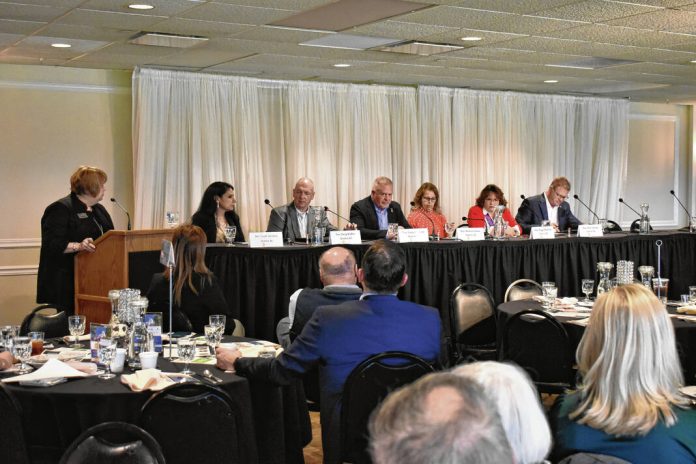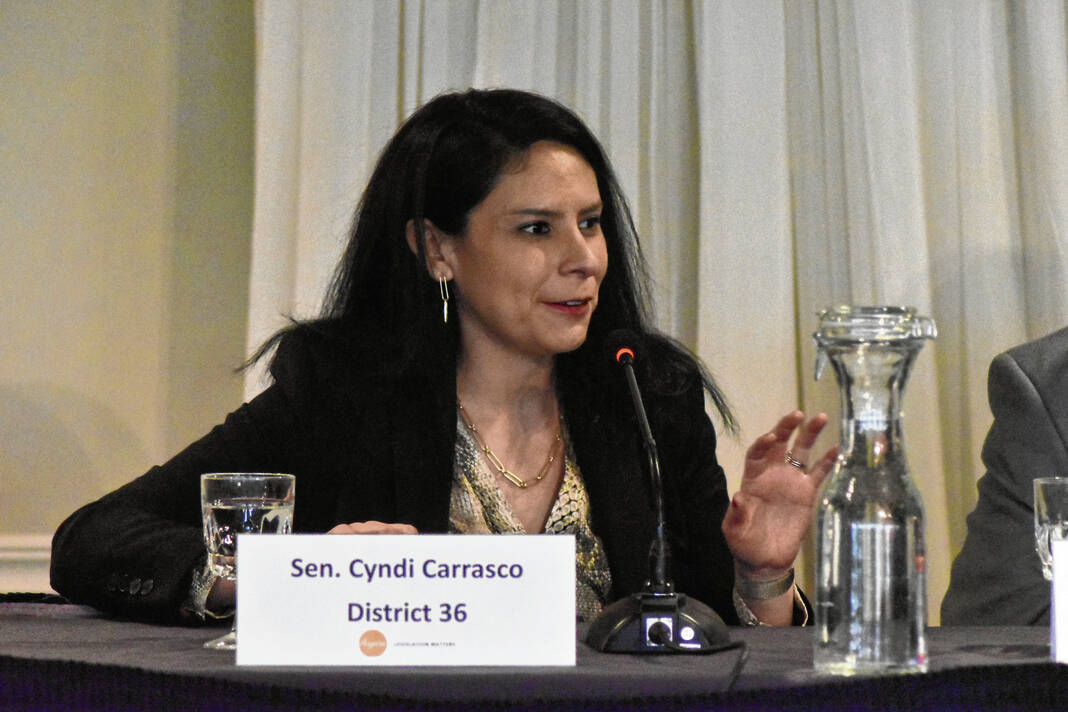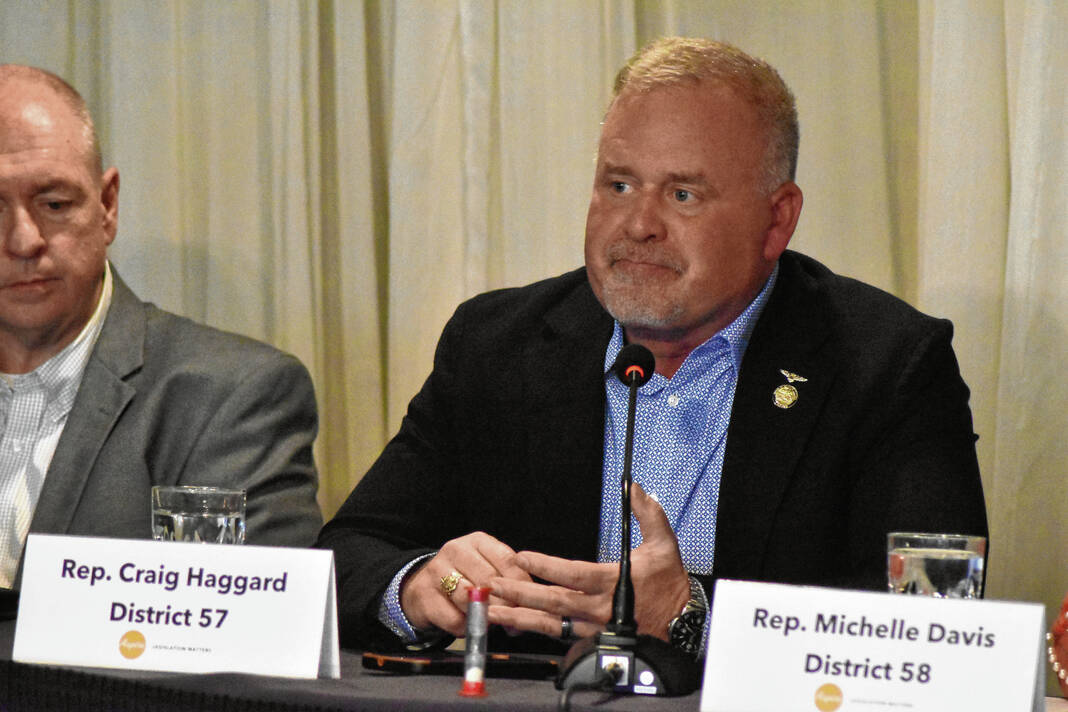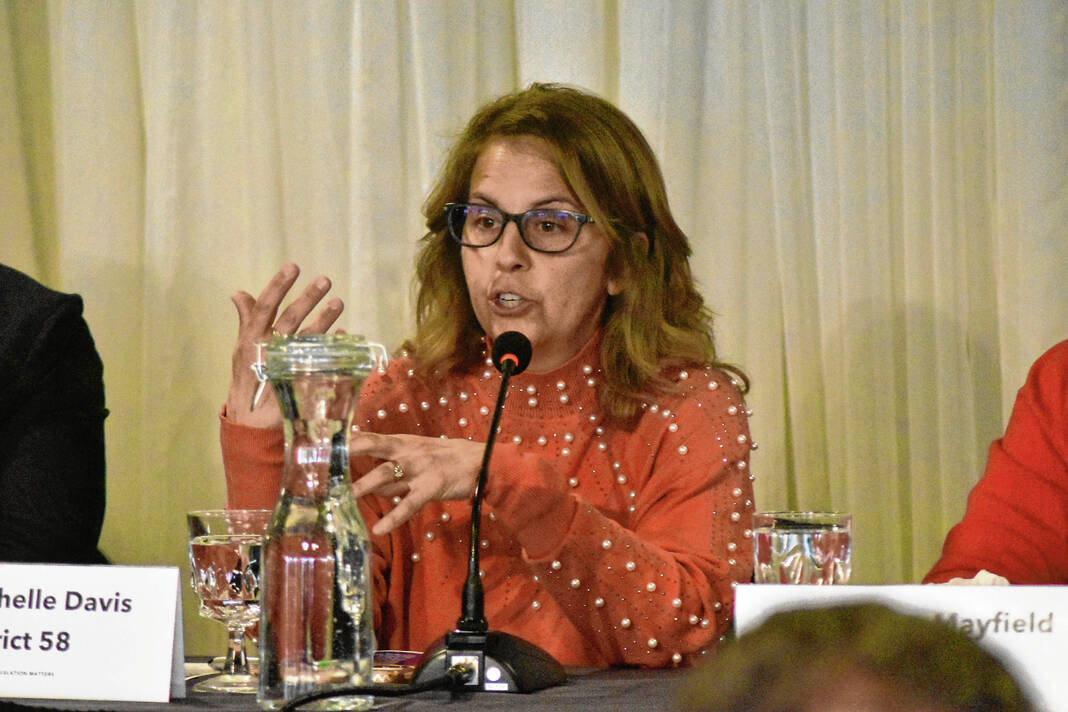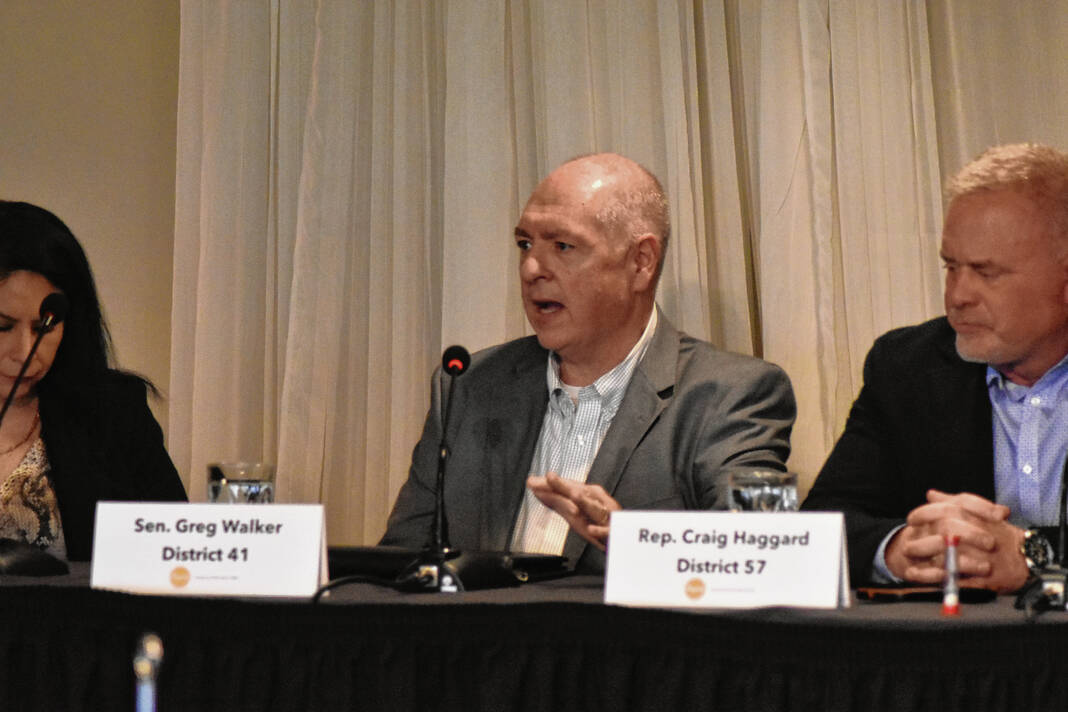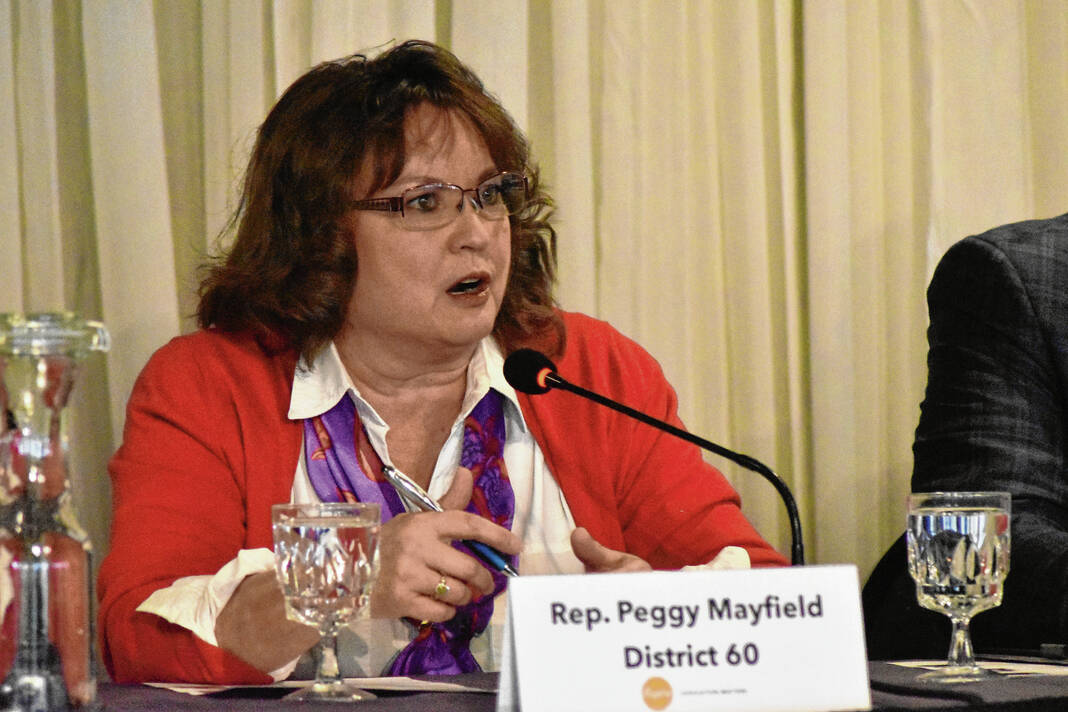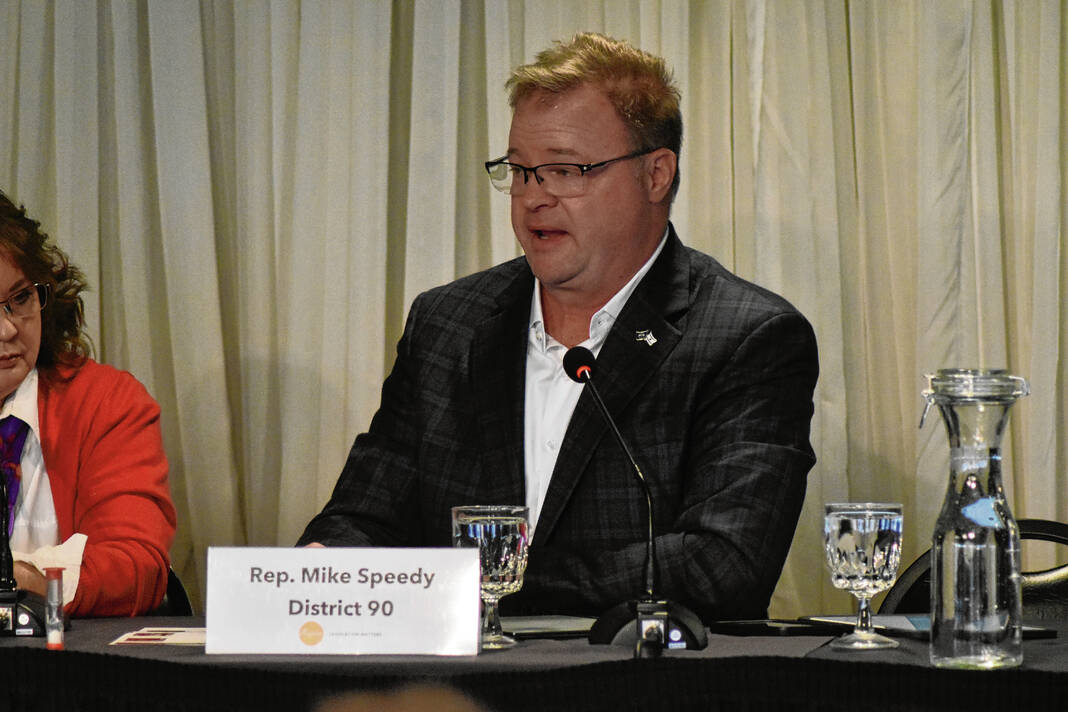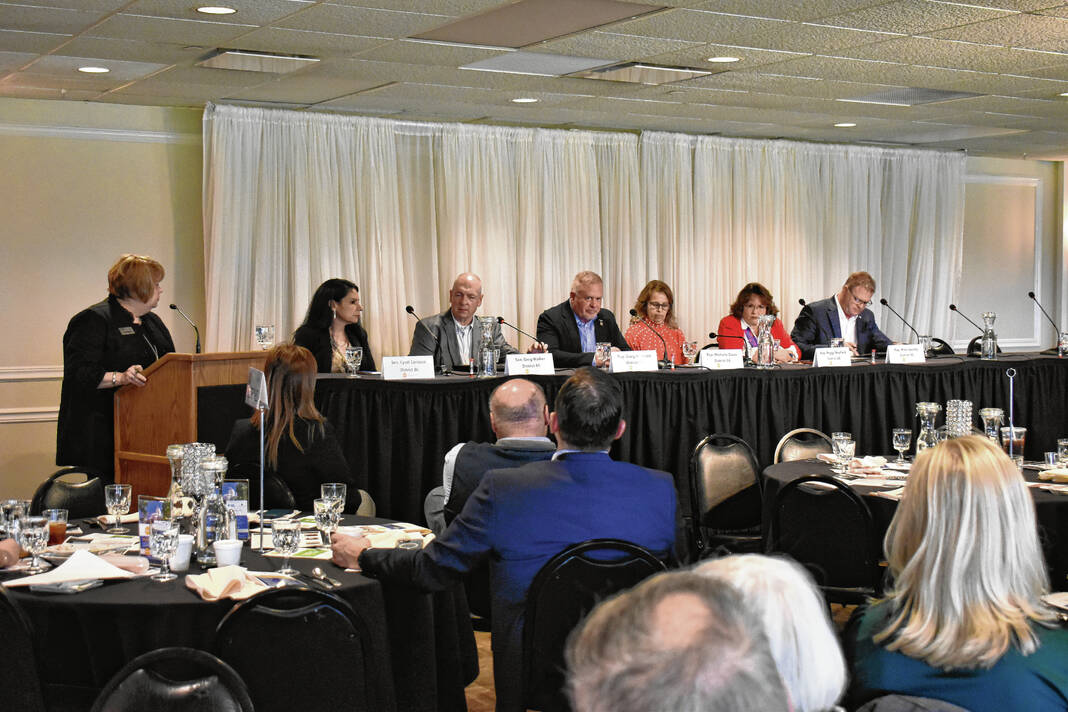A lot was accomplished during this year’s Indiana General Assembly session, lawmakers told local business leaders Friday.
State lawmakers representing Johnson County and the southside of Indianapolis gathered at Valle Vista Golf Club in Greenwood on Friday for a Legislation Matters event hosted by Aspire Johnson County, the county’s chamber of commerce. Six legislators discussed this session’s “wins,” bills they wished went further, local control and property taxes.
This year’s session was a short one, with lawmakers having about three months to get all of their business done.
The ‘wins’
Child care was a “winner” in the eyes of Sen. Greg Walker, R-Columbus. Senate Enrolled Act 2, along with House Enrolled Act 1102, are attempts to work on childcare capacity and eligbility, he said.
“We increased the eligibility of certain funds … but then [HEA] 1102 to try to kind of nibble on the corners of capacity,” said Walker, who is a member of the Senate Family and Children Services Committee.
The efforts by lawmakers this year moved the needle on child care, he said. But an area that still needs work on is how zoning laws and bureaucracy affect child care, he said.
For example, a child care provider in Bartholomew County said they were required to have their entrance doors hardened before they got a license. This is just one example of a disincentive to open a child care center that bureaucracy can create, Walker said.
On the House side, one of the biggest successes of the session was HEA 1001, which addressed work-based learning initiatives. Lawmakers are continuing to expand these experiences to help kids in the future, said Rep. Peggy Mayfield, R-Martinsville.
The next steps will be modifying graduation requirements to gear them more toward employment and work-based learning. The challenge with this is it would create a fiscal impact in a non-budget year, Mayfield said. Lawmakers have to see if the costs can be absorbed by agencies within their current structure, she said.
Another priority in the House was HEA 1004. This bill gave public retirees their 13th check back, among other things, and legislators “finally” got it through this year, said Rep. Michelle Davis, R-Whiteland.
“I think that was a success for us,” Davis said.
Lawmakers wishes
Rep. Craig Haggard, R-Mooresville, told business leaders he wished HEA 1183, which addresses ownership of property by “foreign adversaries,” had gone further. Haggard authored a similar bill on foreign land ownership this session, but HEA 1183 was ultimately passed by lawmakers.
Some of the language from Haggard’s bill made it into HEA 1183, but the passed legislation is missing some things he would’ve liked to see. For example, Chinese companies and citizens will still be able to keep up to 49% of the land they already own in Indiana when the bill takes effect, he said.
Haggard’s version of the bill would have specifically stated visiting teachers and students from China could lease property in the U.S. The lack of this in the passed bill was a concern raised during the debate on the bill, he said.
Haggard plans to introduce a bill to form a working group to address these issues next legislative session, he said.
Rep. Mike Speedy, R-Indianapolis, said he is worried about the fate of HEA 1002, which defines antisemitism and is designed to protect Jewish students from antisemitism on college campuses. The bill passed the legislature but has not yet been signed by Gov. Eric Holcomb. He described the bill as being in “jeopardy,” though he is hopeful Holcomb will sign it.
“I would be extremely disappointed if he didn’t sign it. We would be a lesser state if he didn’t,” Speedy said.
Holcomb has until Tuesday to take action on the bill, according to the Indiana Bill Watch website.
Fresh off her first session, Sen. Cyndi Carrasco, R-Indianapolis, told business leaders she learned a lot during the session. She was pleased to see her first bill, SEA 190, pass, she said. The bill makes state disaster relief funds more accessible.
“We were able to get that through, and I’m happy to report, without a single ‘no’ vote throughout the entire process. I was very, very proud of that,” Carrasco said.
Local control
Lawmakers were also asked about local control, and whether it would be a new normal for the legislature to usurp local government authority. The question was based on an Indianapolis Star article regarding the lawmakers going around local government to address specific issues, such as IndyGo’s Blue Line. The bill regarding the Blue Line was SB 52, authored by Sen. Aaron Freeman, a southside lawmaker who was unable to attend the event.
Haggard told business leaders legislators were “for local government control,” but the Blue Line situation was a more complicated issue than just local control. It was a matter of, what was happening behind the scenes, with the city using state monies and staff, he said.
Lawmakers knew it would require some negotiations with the city, and lawmakers were happy with how it ended up, Haggard said. There was a compromise on the bill to allow the Blue Line to move forward and the bill died.
Carrasco added to this by saying issues are not “zero-sum games” or one way or the other.
“It’s oftentimes I won’t say always, but oftentimes more complicated,” she said. “It’s not all about local control. There are other factors that affect some of the decisions.”
Property taxes
During the local control discussion, the conversation shifted to property taxes. In 2025, lawmakers are expecting to address property taxes — another local control issue, Walker said.
Hoosiers are saying something has to be done about property taxes, and there’s going to be a battle when they start discussing it next year, Walker said.
There are several legislators in both chambers who believe it’s time they stop putting roadblocks into the growth of property tax collection and let local governments take of it. Others question why the legislature would facilitate an expansion of tax levies on property when local units can do it themselves with a local option tax, he said.
“There’s a lot of capacity, I think about $5 billion in revenue capacity across this across the state,” Walker said. “Individual communities have different, they may be near that [property tax] cap, but there’s a lot of capacity, for actually, a lot more revenue.”
A local council could take action to do so, but it will probably be unpopular, he said.
If people really want to have a conversation about local control, it’s going to be around property taxes, Walker said.
Mayfield, a member of the House Ways and Means Committee, told business leaders there are a lot of local option income taxes that have not been implemented at the local level. Lawmakers are going to need to watch how local governments are using their options, such as tax incremental financing districts, she said.
TIFs are a great tool if used correctly, but some uses are not what lawmakers intended it for, she said. This is happening because of the definition of economic development, which is “very broad” under the law, she said.
Legislators may need to consider reining in definitions when it comes to these districts so they are more specific in what they are used for, she said.
IEDC
One of the last topics discussed Thursday was the Indiana Economic Development Corp., specifically its oversight.
A lot of lawmakers want more oversight of the IEDC, the projects they’ve granted and the nondisclosure agreements, Mayfield said. Some of the issues go back to foreign ownership of land in Indiana because some of these developments are owned by China, for example, she said.
“So when you’re talking about growing from $8 billion last year, which was fantastic, up to $22 billion this year, a portion of that in our foreign adversaries buying more land,” she said. “We’ve capped it at 49%, but that’s still a significant amount of foreign ownership of our land, and now it will be the businesses, so that’s a concern.”
The IEDC needs to be monitored a “little bit closer,” and lawmakers can’t just give them “carte blanche,” she said.
Davis added the topic is a good one to bring up because it’s a subject of this year’s governor’s race. She encouraged business leaders to listen to the candidates who are talking about restructuring state agencies, including the IEDC.


